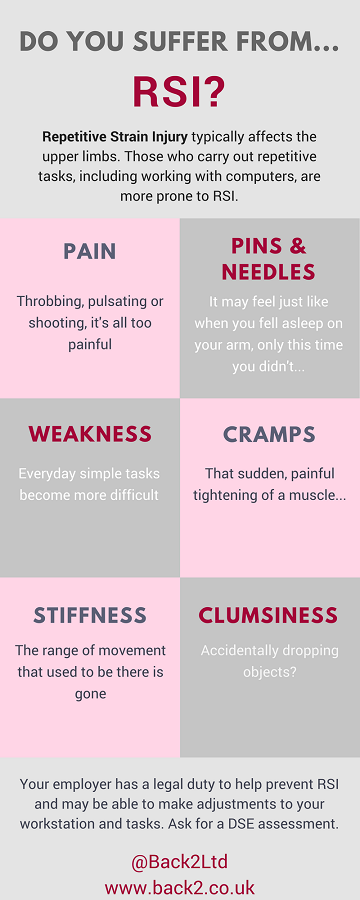Repetitive Strain Injury And Its Symptoms
RSI stands for Repetitive Strain Injury, a type of musculoskeletal disorder also known as work-related upper limb disorder.
It can be related to a number of different professions. However, it is becoming increasingly common among desk workers who are required to use the mouse and keyboard for a considerable period of time. The simple use of these tools may not necessarily cause an injury, which is rather triggered by their incorrect and excessive use.
Repetitive Strain Injury, as the name suggests, is not something that happens overnight. This means that we do have an advantage in terms of stopping the negative action before it causes excessive or permanent damage. The key is to be alert to unusual physical feelings and signs that our body may be trying to send our way for inspection. Pain is our body's natural way to communicate that something is wrong. Unfortunately, when the pain is strong and obvious, some damage has already occurred.
When looking out for potential RSI symptoms or establishing if existing symptoms are related to Repetitive Strain Injury, there are some hints we should consider:
Pins and needles, cramps, stiffness: although not technically pain, these are all signs that something in your musculoskeletal system is not quite right, especially if frequent. Muscles, nerves, and tendons may be suffering from overuse, strain, twisting and other unnatural mechanical actions which are interfering with their natural functioning.
Weakness, clumsiness: the effort your body places on trying to sort these physical strains and the continuing discomfort can affect your natural capacity to control your limbs' range and detail of movement, causing some actions not to produce the desired effect.
To stop RSI in its tracks, the best approach is always to eliminate the root cause of the problem. For desk workers, that would translate into first establishing if their workstation is functional and adapted to their needs. A DSE assessment can help both employer and employee assess the risks posed by the existing workstation and identify any action required to make it suitable for continued use by the end user. There are ergonomic accessories that can improve the working experience and provide relief. A qualified assessor would be able to recommend specific ones based on your needs.
More information on RSI is available from the NHS. If you suspect you are affected or have been diagnosed with RSI, your GP will be able to advise on any treatments to help you manage the pain and recovery.
Additional support is available from the RSI Action charity, which has a London support group.

